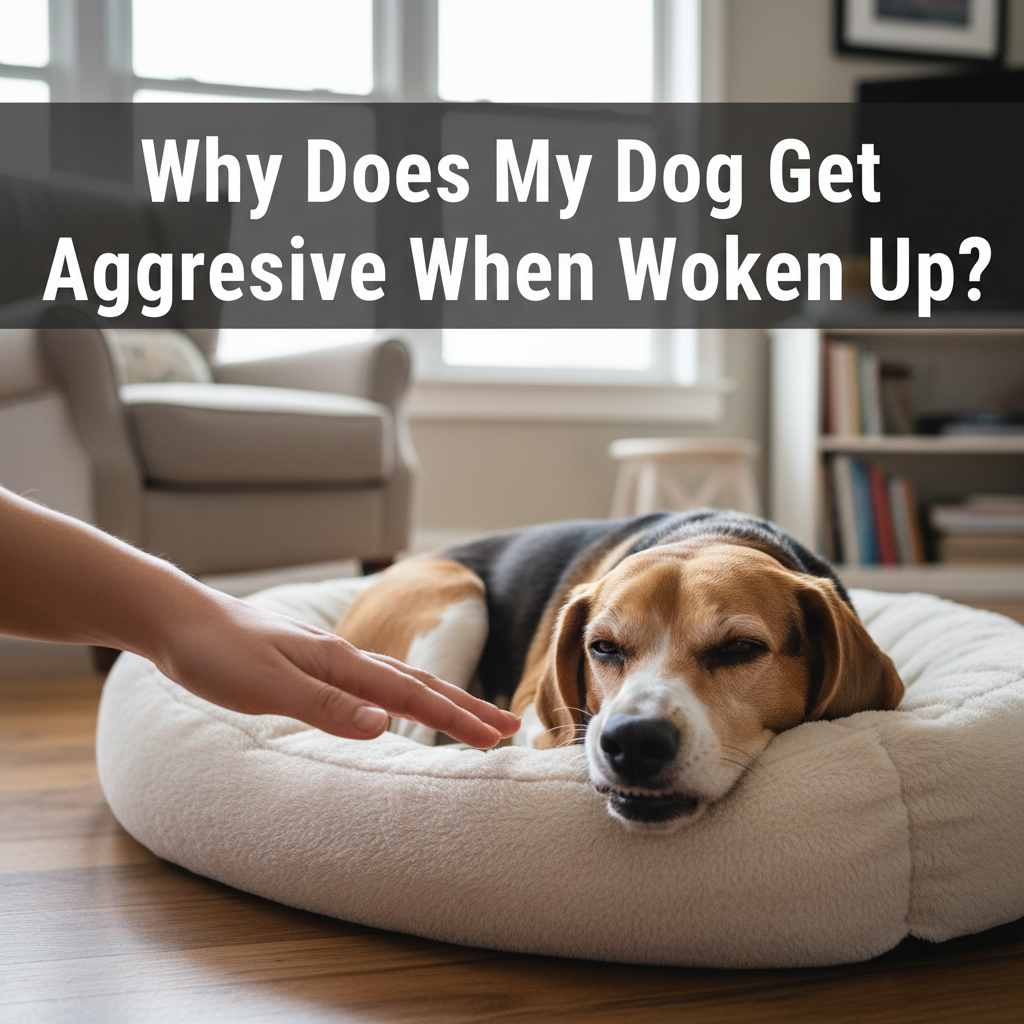Why Is My Dog Aggressive When Woken Up?
Estimated reading time: 5 minutes
- Understanding the instinctive nature of sleep aggression in dogs.
- Identifying contributing factors that enhance sleep aggression.
- Practical strategies for managing and preventing sleep aggression.
- The importance of a secure sleeping environment for your dog.
Table of Contents
- Understanding Sleep Aggression in Dogs
- The Evolutionary Context
- Why Some Dogs Exhibit More Sleep Aggression Than Others
- Contributing Factors to Sleep Aggression
- Best Practices to Manage Sleep Aggression
- Medical Concerns to Consider
- Conclusion
Understanding Sleep Aggression in Dogs
Aggression exhibited by dogs when woken from sleep usually stems from a biological mechanism known as the sleep startle reflex. This instinctive defensive reaction can manifest as growling, snapping, lunging, or biting when a dog is suddenly disturbed during its slumber. It’s important to note that this is not a conscious act of aggression; rather, it’s an automatic survival response triggered by the body’s “fight or flight” mode, releasing adrenaline and causing atypical behaviors upon waking (source: Puppy Leaks, source: FOTP).
The Evolutionary Context
The propensity for sleep aggression in dogs has deep evolutionary roots. In wild environments, ancestral canines had to remain alert against potential threats while sleeping, leading to this physiological survival mechanism. In scenarios where they might be startled awake by an approaching predator or an unfamiliar noise, the instinct to react defensively could mean the difference between safety and danger (source: Puppy Leaks, source: Kinship).
Notably, sleep aggression is particularly prevalent among certain populations of dogs, including ex-racing greyhounds and rescue dogs. Many have experienced unpredictability in their environments, often in cramped kennels where immediate alertness was critical for their safety, hence their heightened startle response (source: Puppy Leaks, source: FOTP).
Why Some Dogs Exhibit More Sleep Aggression Than Others
Individual differences in sleep aggression exist, and while some dogs may eventually “grow out” of this behavior, others may experience it throughout their lives (source: Puppy Leaks). Factors such as genetics, early experiences, and overall temperament contribute to each dog’s likelihood of displaying this reflex.
Contributing Factors to Sleep Aggression
Several factors can exacerbate sleep aggression, including:
- Stress, Nervousness, Pain, or Illness: Conditions such as hypothyroidism, cognitive decline, infections, and Cushing’s Disease can heighten a dog’s sensitivity upon waking. If a dog suddenly displays aggression or has altered behavior during sleep, consulting with a veterinarian is essential (source: Barketplace).
- Negative Conditioning: Dogs that have faced punishment for their sleep aggression may become more insecure and exhibit heightened defensive behaviors, potentially leading to guarding behaviors even while awake (source: Puppy Leaks, source: Barketplace).
- Resource Guarding: If a dog has lost access to a comfortable resting spot or has had negative experiences related to their sleep environment, they may develop protective or aggressive behaviors when they feel threatened or disturbed (source: Barketplace).
Best Practices to Manage Sleep Aggression
Understanding the biology behind sleep aggression can inform practical strategies for preventing these aggressive outbursts. Here are some actionable tips:
1. Provide a Secure Sleeping Environment
Ensure your dog has a comfortable, quiet space where they can retreat to sleep undisturbed. This should ideally be a designated sleeping spot away from household commotion, which allows them to feel safe and secure (source: Puppy Leaks, source: Kinship).
2. Encourage Family Members to Respect Rest Periods
Educate everyone in your household, especially children, on the importance of letting sleeping dogs lie. Encourage them to avoid approaching or touching a sleeping dog to minimize the likelihood of startling them.
3. Use Gentle Waking Techniques
If you must wake your dog, do so gently. Use a soft verbal cue rather than touching them to minimize the chance of startling them and provoking an aggressive response (source: Puppy Leaks).
4. Create a Positive Sleep Association
If your dog tends to sleep aggressively, you may want to consider having them sleep in their bed rather than with humans. This reduces unexpected movements during the night which could agitate them (source: Puppy Leaks, source: FOTP).
5. Avoid Punishment
Never punish a dog for showing signs of sleep aggression. Such punitive responses can worsen insecurity and exacerbate related behaviors (source: Puppy Leaks, source: Barketplace).
Medical Concerns to Consider
If your dog suddenly develops sleep aggression or if there are accompanying changes in their behavior, consult a veterinarian. It’s crucial to rule out any underlying health issues, such as pain or neurological conditions (source: Barketplace).
Conclusion
Understanding why your dog may display aggression when woken up is vital for ensuring a harmonious relationship between you and your pet. The instinctive nature of the sleep startle reflex means that management and prevention are about creating a safe and secure environment, fostering positive sleep associations, and promoting understanding within your household.
If you are grappling with managing your dog’s behavior or would like to further explore best practices in pet consulting, we invite you to contact us for expert guidance. Our team specializes in providing tailored strategies to enhance the wellbeing of your pet, ensuring that their environment promotes safety and comfort. Let us help you navigate the intricacies of pet behavior—reach out today to discover how we can assist you and your furry companion!
